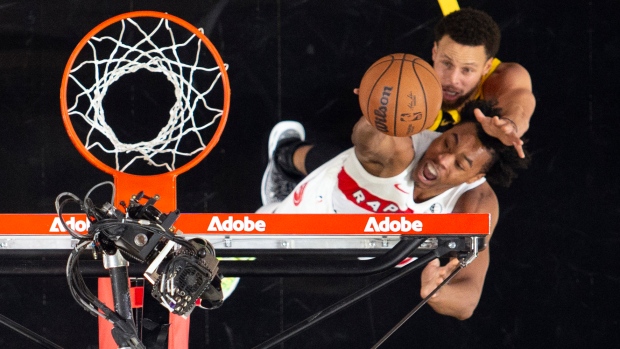Jan 8, 2024
Raptors return on investment is the real deal

Written by: Dan Gladman
Follow: @dgontheroad
Come June of this year, Canadians will be reminded of the Toronto Raptors’ NBA championship. After all, it will be the 5-year anniversary of the historic accomplishment.
That capped an unprecedented run of success for a team that was brought into the league as an expansion club in 1995. In addition to the championship, the team won its division in six of seven years from 2014-2020. Both Nick Nurse and Dwane Casey won Coach of the Year honours and numerous players were All-Stars.
Since that era, the team’s on court performance has been mediocre. The Raptors are on pace to miss the playoffs for the third time in four years.
Despite disappointing results on the court, the Raptors, like literally every NBA team, are a perpetual champion when it comes to the bottom line. The organization’s financial valuation is worthy of the Hall of Fame.
According to Sportico, the Raptors are valued at US$4.11 billion, ranking 9th among all teams in the National Basketball Association. The Golden State Warriors are at the top, worth a cool US$8.28B. Even the last ranking team - the New Orleans Pelicans - value at US$2.72B.
Even more amazing is the Raptors value increasing by 23% in just the past year alone. The team’s 2022-23 revenue came in at US$347 million (Sportico), an increase of $32M from the year before. NBA revenue is up across the board with new profit-generating streams around the corner.
Basketball team valuations have found the spotlight recently with four teams changing hands in the past year, including the Dallas Mavericks. Surprising many sports observers, Mark Cuban sold majority interest of the team at a US$3.5 billion price, considered by many to be a bargain.
Despite the presumed discount, the value of other teams was pulled up by the acquisition. With a new media rights deal being negotiated prior to the start of the 2025-26 season, revenue will undoubtedly continue to skyrocket.
According to Forbes, 50.47% of the league’s revenue comes from media, which is split evenly among the 30 teams. “The escalation in sale price multiples is due to the expectations of a major increase in media rights,” the magazine states. Presently, ESPN (Disney) and Turner Sports (Warner Bros. Discovery) control US rights for a combined US$2.66B annually with international distributors accounting for another $500M.
Speaking at the Goldman Sachs Alternatives Summit, NBA commissioner Adam Silver told the audience that “sports are almost the only programming that people truly care about watching live.” The NBA ranks second behind the National Football League in annual revenue but has been able to watch and learn as the world’s biggest league traversed the evolving media landscape into its current record-setting deal.
The NFL surprised many by including streamers in its current broadcasting package. There is a weekly Thursday Night Football on Amazon Prime and Red Zone streams on YouTube. Audiences continue to grow on each platform. Murmurs continue that the NBA will include streaming as well.
Reports conclude that Silver is looking for a US$7B annual package for media rights. Remember, last year’s number was $2.66B. Nearly tripling that might not materialize but what if it doubled? Five billion dollars spread evenly among 30 teams on an annual basis would enhance earnings to the tune of approximately $150-160 million per year, per team. The cap on player salaries, an NBA team’s largest expense, is presently US$136M.
So who will join the NBA as national broadcast partners? ABC/ESPN and Turner are unlikely to relinquish their stakes, but John Ourand of Puck News reported on his Marchand and Ourand Sports Media Podcast that NBC is in contention for a return to NBA broadcasting, and would potentially bring along its streaming service Peacock. One or more of Prime, Apple TV and YouTube could be in the mix as well. Ourand maintains that the streamers have been “disciplined” in their negotiating approaches, but those around the NBA are certain that big tech will enter the picture in the next composition of a rights package.
Additionally, NBA expansion is coming more and more into frame. Las Vegas and Seattle are likely to join the league within five years. (Vancouver and Mexico City are long shots). According to Sportico, the expansion fee could rise as high as US$5 billion, yet another cheque for NBA teams. But unlike all other basketball-related revenue, team owners would not have to share this amount with players.
The combination of booming international interest, recent franchise sales, upcoming expansion fees and the next lucrative media rights deal have come together as a perfect storm to raise team valuations into the stratosphere.
The Huddle Up newsletter reports that “NBA teams used to trade at a 3-4x revenue multiple, but now they routinely trade at a 10x revenue multiple.” This exemplifies the value of a team such as the Toronto Raptors, presently owned by Maple Leaf Sports and Entertainment, a conglomerate of Bell (which owns BNN Bloomberg ), Rogers and Kilmer Sports.
CTV News reported in 2011 that Bell and Rogers were spending CDN$1.32 billion to purchase 75% of MLSE, or $533M each. Incredibly, the NHL’s Toronto Maple Leafs were valued in November, 2023 at US$2.65 billion, tops in the league. Combined with the Raptors and Toronto FC of Major League Soccer - valued by Forbes at US$690M - the owners have seen their investment increase sixfold in 12 years.
At some point speculation of a sale of the Raptors, or perhaps an MLSE ownership restructuring, will surface. It’s only been five years since the Raptors’ title and fans continue to rejoice, with no indication that their motivation to support the team will falter - win or lose. The Maple Leafs’ last Stanley Cup win was in 1967, suggesting the theory of unstoppable team support is longitudinal.
The real accomplishment of the Raptors will be felt in perpetuity by the current owners.